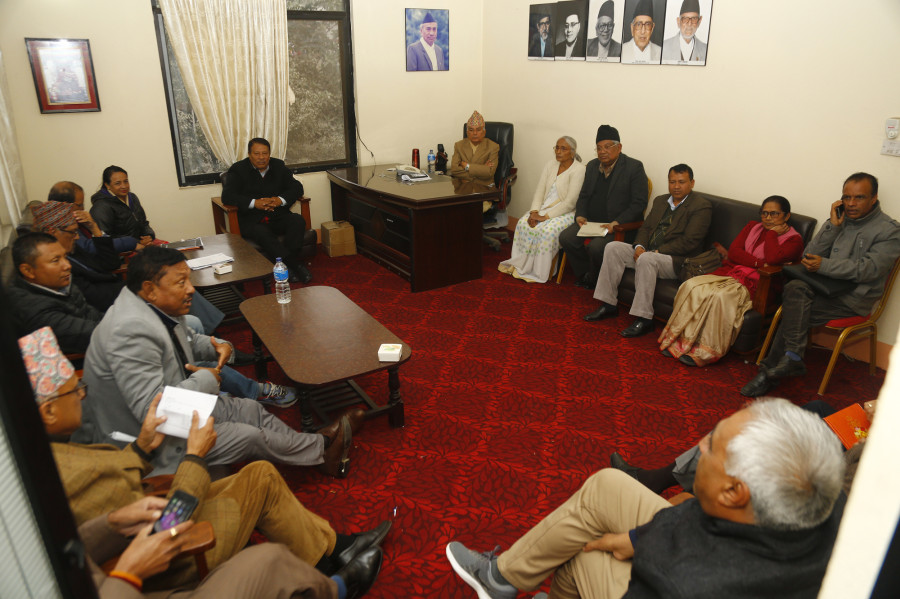Politics
Polarisation deepens in Congress after Deuba fails to table plan for general convention
Opposing factions accuse the party president of attempting to evade the responsibility of holding the general convention.
Anil Giri
Factional feuds and polarisation have deepened in the Nepali Congress, which has been struggling to get back on its feet since a spectacular defeat in the 2017 elections.
On Thursday, opposing factions boycotted a Central Working Committee meeting after party President Sher Bahadur Deuba failed to table a work plan to hold the 14th General Convention.
Leaders from two separate factions, led by Ram Chandra Poudel and Krishna Prasad Sitaula, refused to attend the meeting demanding that Deuba come up with a work plan for the general convention, which needs to take place within three months, before March 2020.
Instead of the work plan, Deuba tabled proposals to form 41 different party departments, up from the existing 28, irking the rival factions who then boycotted the meeting.
The current term of all elected party bodies is going to expire in March 2020. All senior Congress leaders have agreed to extend their term by a year as per the party charter. If the party fails to hold the general convention within their extended term, March 2021, as per constitutional provisions, the party can again extend their term and mandate by another six months. Beyond that, the party will have to hold its general convention and elect new bodies from the central to the ward levels.
According to leaders, proposals like congratulating Nepali sportspersons who won medals in the recently concluded South Asian Games, opposing the government’s bid to introduce a Constitutional Council Ordinance, discussion on the party’s report on the formation of various interim structures and 41 departments, among others were tabled.
“We had agreed to table the work plan for the 14th general convention before mid-December but the party president has attempted to delay that,” Poudel told the Post. “Instead of tabling the work plan, he brought up other insignificant issues in the meeting.”
During the Central Working Committee meeting on August 6, the party top brass, including Deuba, Poudel and Sitaula, had reached a gentlemen’s agreement to come up with a work plan by mid-December to hold the general convention.
The plan was to simultaneously complete the formation of interim structures at all 165 federal constituencies, 330 provincial electoral constituencies, 753 local units and over 6,000 ward committees.
“Such a step by the party president will plunge the party into a crisis,” said Poudel. “He is trying to evade the responsibility of holding the general convention on time. Deuba has also tried to increase the number of party departments from 28 to 41, which we have been objecting to.”
Initially, Deuba and Poudel had held a brief meeting on Thursday, ahead of the Central Working Committee meeting.
According to Poudel, Deuba had assured that he would discuss with his “friends” about the work plan and get back to him.
“But he never did,” said Poudel.
Factionalism is nothing new for the Congress party. At one point of time, it was Deuba who had deserted the party, accusing the late Girija Prasad Koirala of running the Nepali Congress as if it were his fiefdom.
But today, Deuba is facing the same charge.
Gagan Thapa, a central committee member, described Thursday’s incident as a serious turn of events, saying the establishment faction is trying to sideline other groups in the party.
“Grievances and demands put forth by the Poudel faction were justified. They were in line with previous understandings,” Thapa told the Post. “The party president failed to table the work plan for the general convention despite agreeing to do so.”
After the Deuba faction refused to take the grievances of other groups into account, leaders from the Poudel and Sitaula factions have scheduled a meeting at the residence of senior leader Prakash Man Singh to chart out their future strategy.
The Deuba faction, meanwhile, has rejected all allegations made by the Poudel and Sitaula camps.
The agenda of the meeting was prepared by General Secretary Shashank Koirala, who belongs to the Poudel faction, said a leader from the Deuba camp.
According to the party spokesperson, Bishwa Prakash Sharma, who is considered to have close relations with Deuba, both sides had agreed to table the work plan for the general convention only after the formation of all interim structures in the party.
“The process of forming thousands of interim structures has yet to be completed,” said Sharma.
According to Sharma, the decision to increase the number of party departments from 28 to 41 was also not Deuba’s idea; it was taken when the late Sushil Koirala was the party president.
“So it is not a new proposal,” Sharma told the Post. “Anyway, it was just a proposal and all central members could have taken part in the discussion.”
Sharma, however, appeared optimistic that Thursday’s incident will not create a rift in the party.
“The next meeting, which is slated for December 15, will sort out all differences and the party will remain united,” said Sharma.
But leaders from the opposition factions said they would not cave in to the establishment’s high-handedness.
“Today’s incident was the result of what Deuba did, and it will polarise the party further,” said Thapa.




 13.12°C Kathmandu
13.12°C Kathmandu














